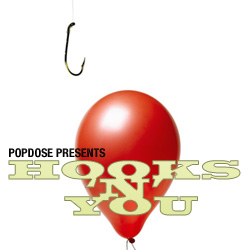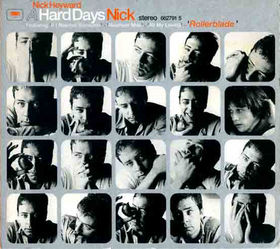
I liked Nick Heyward before I ever knew I liked Nick Heyward.
In the hazy, lazy days known as the early ’80s, I was just as enthralled by MTV as everyone else, but I hadn’t yet begun my descent into music obsession, so I was basically just watching videos, enjoying the songs, and moving on. Because of this, I didn’t really know who was in what band…aside, of course, from the matinÁƒ©e names like Boy George, George Michael, and so on. Time passed, however, and the more I dove into my studies of alternative music (I have many a tattered edition of “The Trouser Press Record Guide” on my bookshelves), the more I learned about these various groups, and as the various bands broke up and found their frontmen going solo, I began to follow their careers as well…including, as you may have guessed, the former lead singer of Haircut 100.
My first introduction to Nick Heyward’s solo work was 1988’s easily-dismissed I Love You Avenue, and I’m clearly not the only one who felt that description was apt, given that I purchased my copy from a cutout bin, but just because it’s a slight album doesn’t mean I didn’t enjoy it. It’s definitely a very, very ’80s-sounding album, but there are at least a pair of songs which continue to hold up for me: “You’re My World” and “Tell Me Why.” (Possibly not coincidentally, these tracks were both mixed by John Hudson, who also worked with a-ha and The Dream Academy.) As you may have guessed, I Love You Avenue was not a tremendous commercial hit, and Heyward proceeded to vanish for a few years, but when he reemerged in 1992, it was with an album which would – gasp! – earn him a bonafied hit!
Yes, not only did From Monday To Sunday offer up the instantly memorable “Kite,” it also proved to be the strongest album of Heyward’s solo career to date, finding him shedding himself of almost all of his keyboards and getting back to basics…or, more specifically, back to The Beatles. Better yet, the critical and commercial success of the album in the U.S. meant that Heyward going to get the chance to expand on this new sound on his next record…which he did.
Too bad you had to pay ridiculous import prices to hear it.
Inexplicably, Epic – Heyward’s label at the time – took a pass on releasing his 1994 album, Tangled, in America. This is not hyperbole; I really have absolutely no explanation for why they chose not to put it out over here. The guy was in an optimal position to build on the success of From Monday to Sunday, and he was completely denied that opportunity, which is – to be frank – fucked up. Did someone think that he’d already defied the odds once by having a hit with a breezy pop song in the middle of grunge, and that there was no way he could repeat it? If so, they clearly never actually listened to Tangled. It would be an overstatement to suggest that Nick really rocked out with his cock out or anything, but to hear his opening salvo, “Kill Another Day,” was to be aware that he’d toughened up his act at least a little bit.
Julian Gordon Hastings produced and mixed the disc, and it’s evident that he went out of his way to make Heyward a bit more viable for the tastes of the day…which is a little ironic, given that most of Hastings’ work had been with the ’60s prog-rock band Caravan. Nonetheless, he succeeds across the board by taking Heyward’s Beatle-inspired pop songs and infusing them with a fair amount of balls, making tracks like “Backdated” and “Can’t Explain” punchier than just about anything on the preceding album but just as catchy.
Inevitably, my favorite tracks tend to be the same ones released as singles, but for as much as I love “The World,” I can’t deny the sheer irresistibility of the follow-up single, “Rollerblade,” which is truly one of the greatest lost Britpop singles you’ll ever hear. (It also gave Heyward the chance to truly wear his Beatles influence on his sleeve, releasing an EP called A Hard Day’s Nick, which led with “Rollerblade” and followed with straightforward covers of three of his favorite Fab Four songs, including “If I Needed Someone.”)
The creative success of Tangled didn’t translate into enough sales for Heyward to keep his contract with Sony in the UK, however, but he did manage to produce an equally-satisfying follow-up for Creation Records (1998’s The Apple Bed), an album which did manage to be released Stateside. Unfortunately, Big Deal Records, bless them, weren’t able to do enough promotion to earn Heyward any significant success with it, and Creation ultimately failed on their side of the water as well. Coincidentally or not, no proper follow-up to the record has emerged to date.
But, wait, all hope is not lost!
I managed to get hold of Mr. Heyward via MySpace, and though his lack of a home internet connection necessitated that our communique be short and sweet (he checks his account via a local internet cafe), he did manage to answer a few questions about Tangled, plus one quickie about the album that first brought him into my CD collection, and sounded optimistic that a new album might yet come to pass.
As an American, my first curiosity is why Tangled never saw US release. You were coming off From Monday to Sunday, and not to speak ill of your former label, but it seemed like Epic really missed an opportunity to capitalize on the success of “Kite.”
Yes, they did miss the opportunity, and I haven’t got a clue why they missed it. There are many of these little breadcrumbs of ambiguity that lay behind me on the pathway. They may become diamonds on the soles of my new shoes: handmade and built to last!
Do you have any specific recollections of the recording experience, and what are your favorite songs?
It was a tangled time. I escaped to the south coast of England to make it. Wrote most of the lyrics in the cafes of Rye, and recorded it in the town of Battle. Spent a long time looking for the sound of the record and found it on the song “She’s Another Girl,” but, sadly, while we were sleeping, the settings on the desk and the amps got all tangled up by someone. Favourites? “I Love The Things,” “London,” “The Breadwinner,” “She’s Another Girl,” “The World,” “She Says She Knows,” “Carry On Loving.”
I’ve been known to call out “Rollerblade” as one of the great lost Britpop singles of the mid-’90s. Whose idea was it to release that great Hard Day’s Nick EP?
Glad “Rollerblade does” it for you, Will! The idea for the song came from being in the USA touring after my Kite took off. Rollerbladers everywhere! It was surfin USA, and the Beach Boys were gliding through my day. It was Jason Iley, who was my product manager at Sony, I think…he suggested recording a selection of Beatles songs so he could have something lovely to promote the single with. Lovely recording. Lovely band. Lovely songs. Lovely time. Lovely.
I know you pop up at a lot of those flashback festivals, but when can we expect to see another studio album from you?
Yes, I’ve been popping up at those flashback festivals in new order to invest in another studio album. Take the coal of the past and pop it into the train engine to drive it into the future. Of course, it always has and always will be the present, so really I’ve just been re-arranging the present to compose a new present, he he.
And a bonus question about a different album, if you can stretch back that far. The first album of yours I ever bought was actually “I Love You Avenue,” which, for all its very late ’80s production, still gets regular spins ’round my house. Is that one you’d as soon forget, or do you harbor a fondness for it as well?
Actually, I’ve re-discovered some of the songs on I Love You Avenue, too, and singing them without the production of the time is really rather lovely! ‘Traffic in Fleet St,’ ‘I Love You Avenue,’ and ‘This Is Love.’ But, yes, most of them are, at the end of the day, the meanderings of a moany twenty-something pop star, and best kept exactly where there are!






Comments